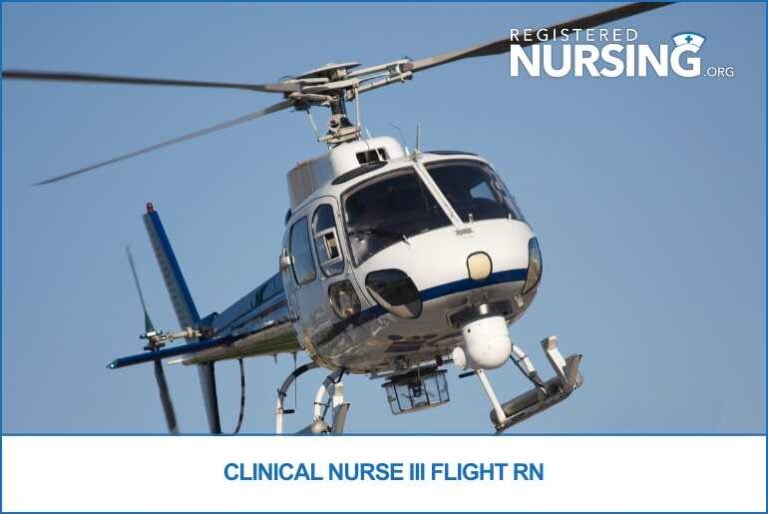Clinical Nurse III Flight RN
- What Is a Clinical Nurse III Flight RN?
- Job Duties and Responsibilities
- Required Skills and Qualities
- Education and Certification Requirements
- Typical Work Environment
- Salary and Job Outlook
- Career Advancement Opportunities
- How to Excel as a Clinical Nurse III Flight RN
- Taking the Next Step in Your Nursing Journey
- Sources
- Latest Articles & Guides

Air medical services transport more than 550,000 patients each year in the United States, with demand growing steadily as rural hospitals close and trauma systems expand (Association of Air Medical Services). At the heart of this life-saving work are Flight RNs—elite nurses who bring critical care expertise to the skies. Among them, Clinical Nurse III (CN III) Flight RNs stand out as experienced clinicians who lead and innovate in high-pressure environments.
This article offers an in-depth look at the CN III Flight RN role, including key responsibilities, required skills, and pathways to advance. Whether you’re an aspiring flight nurse or a seasoned RN looking to grow, this guide will help you understand how to thrive in this exciting, high-stakes field.
What Is a Clinical Nurse III Flight RN?
A Clinical Nurse III Flight RN is a senior-level registered nurse who delivers advanced critical care while transporting patients via helicopter or airplane. These professionals are essential members of air medical teams, responsible for stabilizing and treating patients during transfer from accident scenes or between medical facilities.
The CN III designation reflects not only extensive bedside experience but also contributions to clinical leadership, mentorship, and evidence-based nursing practices. This role blends emergency nursing with aviation protocols to ensure patient safety and outcomes in unpredictable environments.
Job Duties and Responsibilities
Flight nursing requires multitasking under pressure. CN III Flight RNs are expected to apply their clinical expertise and leadership in challenging, fast-paced scenarios.
Their main responsibilities include:
- Assessing and managing critically ill or injured patients in transit
- Performing advanced interventions such as intubation, chest decompression, and sedation
- Operating complex equipment, including ventilators, infusion pumps, and cardiac monitors
- Collaborating with pilots, paramedics, and hospital teams for coordinated care
- Documenting all care provided during flight and participating in quality assurance
- Acting as mentors or preceptors for new flight crew members
The ability to make autonomous decisions and prioritize care on the fly is what sets these nurses apart.
Required Skills and Qualities
The Clinical Nurse III Flight RN role requires more than technical skill. It demands emotional intelligence, resilience, and leadership.
Core Competencies
- Critical Care Mastery: Expertise in managing trauma, respiratory failure, cardiac emergencies, and neurological crises.
- Clear Communication: Efficient handoffs, accurate documentation, and calm coordination with diverse teams.
- Leadership: CN III nurses mentor colleagues and lead clinical improvement initiatives.
- Technical Skill: Competence with life-saving equipment and aviation safety protocols.
- Adaptability: Comfort operating in non-traditional, mobile environments with limited support.
Education and Certification Requirements
Becoming a Clinical Nurse III Flight RN involves a strategic blend of formal education, field experience, and specialty certifications.
The table below outlines the recommended pathway:
| Step | Requirement | Details |
| 1 | Nursing Degree | ADN or BSN (BSN preferred for CN III roles) |
| 2 | RN Licensure | Active RN license via NCLEX-RN |
| 3 | Clinical Experience | 3–5+ years in ICU, ED, or trauma care |
| 4 | Certifications | BLS, ACLS, PALS, PHTLS/ITLS, CFRN |
| 5 | CN III Advancement | Complete clinical ladder requirements including leadership, mentorship, and professional development |
This role often attracts nurses who thrive on complexity and continuous learning. These individuals are drawn to environments where rapid decision-making, evolving protocols, and diverse clinical presentations are the norm. The ever-changing nature of air transport nursing challenges RNs to constantly adapt, update their skills, and engage in ongoing professional development to stay current with best practices in both emergency medicine and aviation safety.
Typical Work Environment
CN III Flight RNs work in some of the most dynamic and unpredictable clinical settings in healthcare. These include:
- Air Ambulances: Helicopters for scene response and short-range transport
- Fixed-Wing Aircraft: For longer distance or weather-restricted transport
- Rural/Remote Locations: Providing critical access in areas with limited healthcare infrastructure
- Disaster Relief and Evacuation Missions: Deployments for natural disasters or mass casualty events
Shifts may extend beyond 12 hours, and flight calls can occur anytime. These nurses must be physically fit and mentally prepared for rapid response.
Salary and Job Outlook
Flight RNs earn competitive salaries, especially those with CN III status who bring added value in leadership and advanced skills.
| Level | Estimated Salary |
| Flight RN (National Average) | $80,000–$100,000 |
| Clinical Nurse III Flight RN | $100,000–$120,000+ |
Job prospects are strong due to ongoing shortages in rural healthcare, increased reliance on air transport, and a national emphasis on trauma-informed emergency care (U.S. Bureau of Labor Statistics).
Career Advancement Opportunities
A Clinical Nurse III Flight RN can explore multiple paths for advancement, each offering opportunities to specialize or lead.
- Clinical Nurse Specialist (CNS): Focus on care delivery systems and staff education (AACN)
- Acute Care Nurse Practitioner (ACNP): Expanded scope in managing complex patient cases
- Flight Program Director: Administrative and operational oversight of air transport teams
- Instructor/Educator: Teaching in flight or critical care nursing programs
- Quality and Safety Roles: Improving systems to reduce risk and enhance patient outcomes
Each path offers a way to deepen your impact while growing professionally. Whether you’re drawn to education, policy, clinical leadership, or advanced practice, your foundation as a CN III Flight RN can serve as a springboard to even broader influence and fulfillment.
How to Excel as a Clinical Nurse III Flight RN
Standing out in this role requires dedication beyond initial qualifications. Here are strategies to succeed and thrive:
- Commit to Ongoing Education: Attend flight nursing conferences and pursue advanced certifications
- Join Professional Organizations: Get involved with ASTNA or other specialty groups for networking and CE opportunities
- Mentor Others: Share knowledge to strengthen your team and fulfill CN III expectations
- Embrace Innovation: Be open to new equipment, protocols, and care models
Case Insight:
Sarah, a CN III Flight RN in Colorado, credits her success to joining her hospital's flight team committee early in her career. By participating in protocol development and staff training, she positioned herself as a leader and was later promoted to educator within her flight program.
Taking the Next Step in Your Nursing Journey
If you’re a critical care RN with a passion for emergency medicine and a desire to push boundaries, becoming a Clinical Nurse III Flight RN may be the perfect path. The role offers unmatched challenges and the chance to make a life-saving impact every day.
Start by mapping your path: assess your experience, obtain key certifications, and explore programs that support flight nursing. Engage with mentors, ask questions, and take action to position yourself for success.
Your next career leap could take you sky-high, literally and professionally.
Sources
- Association of Air Medical Services (AAMS)
- National Council of State Boards of Nursing – NCLEX
- U.S. Bureau of Labor Statistics – Registered Nurses
- American Association of Critical-Care Nurses (AACN)
- Air & Surface Transport Nurses Association (ASTNA)
Latest Articles & Guides
One of the keys to success as a registered nurse is embracing lifelong learning. Our articles and guides address hot topics and current events in nursing, from education to career mobility and beyond. No matter where you are on your nursing journey, there’s an article to help you build your knowledge base.
Browse our latest articles, curated specifically for modern nurses.



